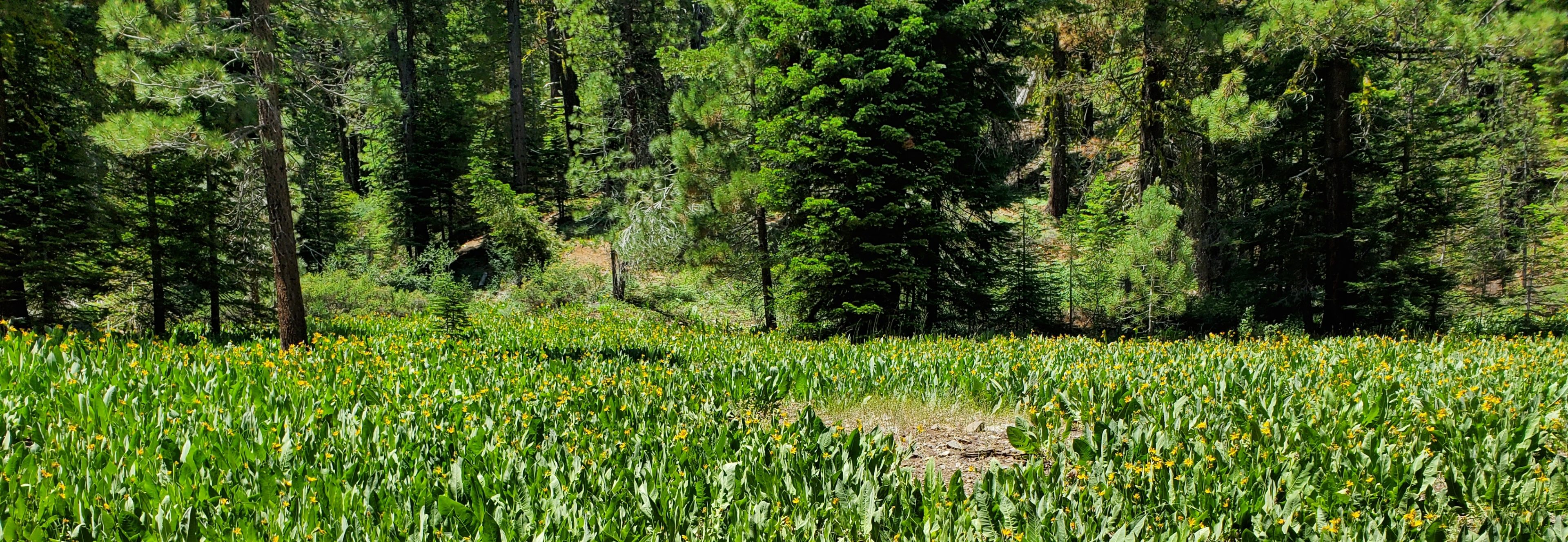I fasted for 70 hours over the bustling and extended holiday weekend, alone on a ridge overlooking my community.
I ate my last pre-fast meal on Friday around noon, and then headed out on foot. It took me less than 4 hours to hike where I was going, a predetermined spot I’ve been scoping out on day runs.
It had been a while since I’d carried a 20-pound pack. I’m used to running with nothing but my keys and phone. It brought back some nice memories from long backpacking trips. I also noticed the increased challenge of walking slowly, about half my easy jogging pace. I was more prone to boredom. But I know that boredom is merely a sign that I’ve left myself, and that I’m avoiding the ever-fascinating, and often unpleasant, landscape of my thoughts and emotions.
I set up camp upon arrival. I didn’t realize a small yet clear and cool stream was flowing about 100 feet away. Perfect. No long empty-stomach treks would be needed to bring water back every day.

No one bothered me the entire time. I was about 200 feet from a trail, and saw about 5 mountain bikers pass by the entire weekend. I saw one deer the first day, and what looked like some wild gopher, emerging from its hole to gather grass. There were a lot of insect visitors. Bird song was almost constant, as was the wind.
I laid in a hammock a lot, swatted swarms of the quick biting flies that emerged multiple times every day, typed some emails and journals, took some time-lapse videos with my GoPro, which I also used to record myself talking about the experience later, which I’m not 100% sure I’ll ever actually publish.
I found fasting to be really tiring physically. I wonder if that is part of why it has been done in many spiritual traditions. It reminded me of being sick with a fever, during which times I find myself focusing much more on my body, because it is so busy with activity (being invaded by pathogens while my immune systems fights for my life). I think a lot also happens in the body when we are very hungry too. I read about the studies, of which I remember little. I knew that I wouldn’t be taking blood measurements of my vitals before and after. My experience, during and after, would be my data to analyze.
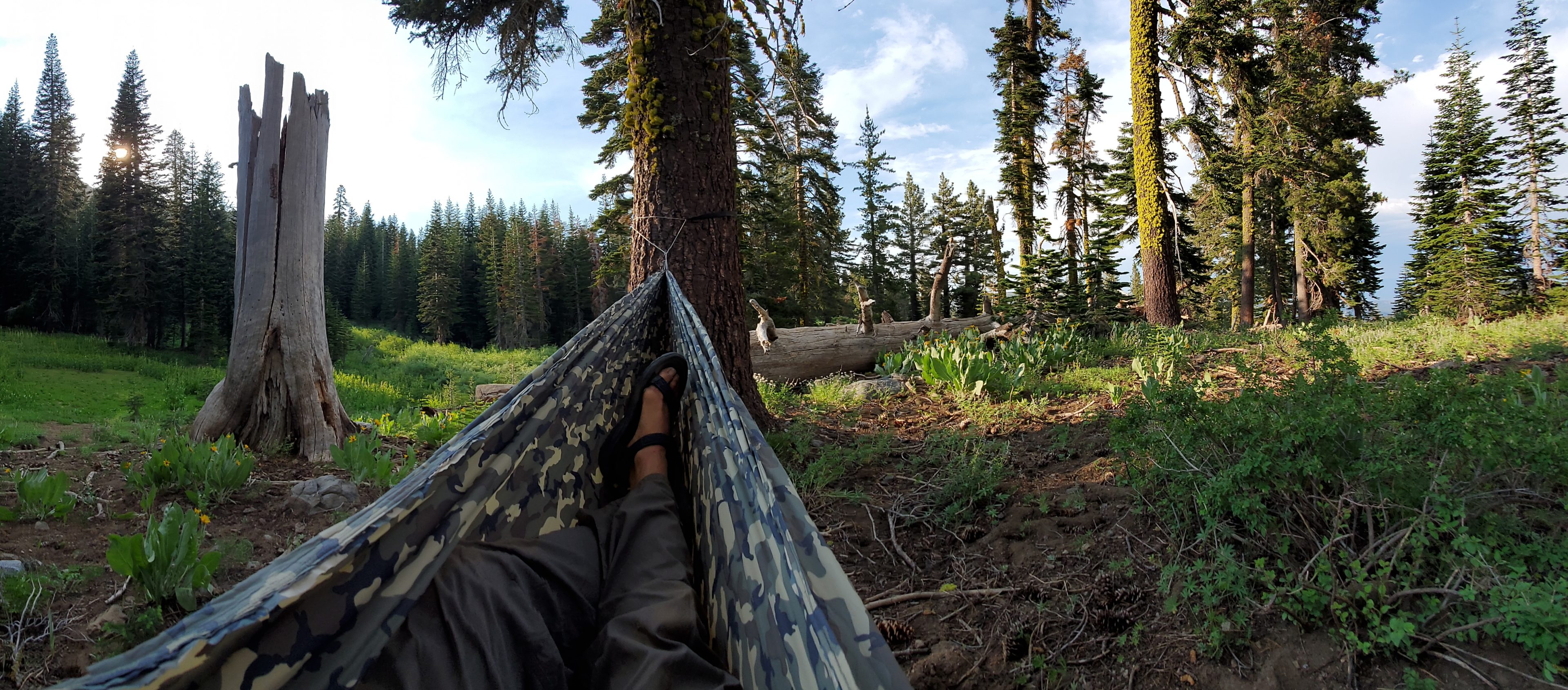
I did have some apprehension about this experiment…some worry that I was wasting my time. So I tried to bring together what I have read about longer fasts with my in-the-moment experience, to better understand the rhyme and reason behind them.
I had this thought: “There is no escape from the hunger and fatigue. I’m in a crucible.”
In a way the pain reminded me of ice water immersion, and long distance running, except that I was stuck in the suffering. There was no analog to getting out of the ice water, or stopping the run, both of which can be done right away. There was nothing to eat, and the body will do what the body does when it wants food. Waves of fatigue, hunger, and accompanying emotions come and go.
I’d watch my mind judging the experience: “Shouldn’t you have more energy? Didn’t other people say they’d have waves of clarity and feel great sometimes?”
Then a defense (another mind character): “Yes but that was usually not the 2nd day. It’s okay, this is probably how it is for others.”
And so went many conversations I had with myself over the several days.
Sometimes other people would become part of those conversations. I realized that I’d never had those conversations before, and maybe it was good for me to have them, alone. Maybe it was helping me resolve and let go of some unresolved issues, and release some trapped feeling I’d been carrying around for months.
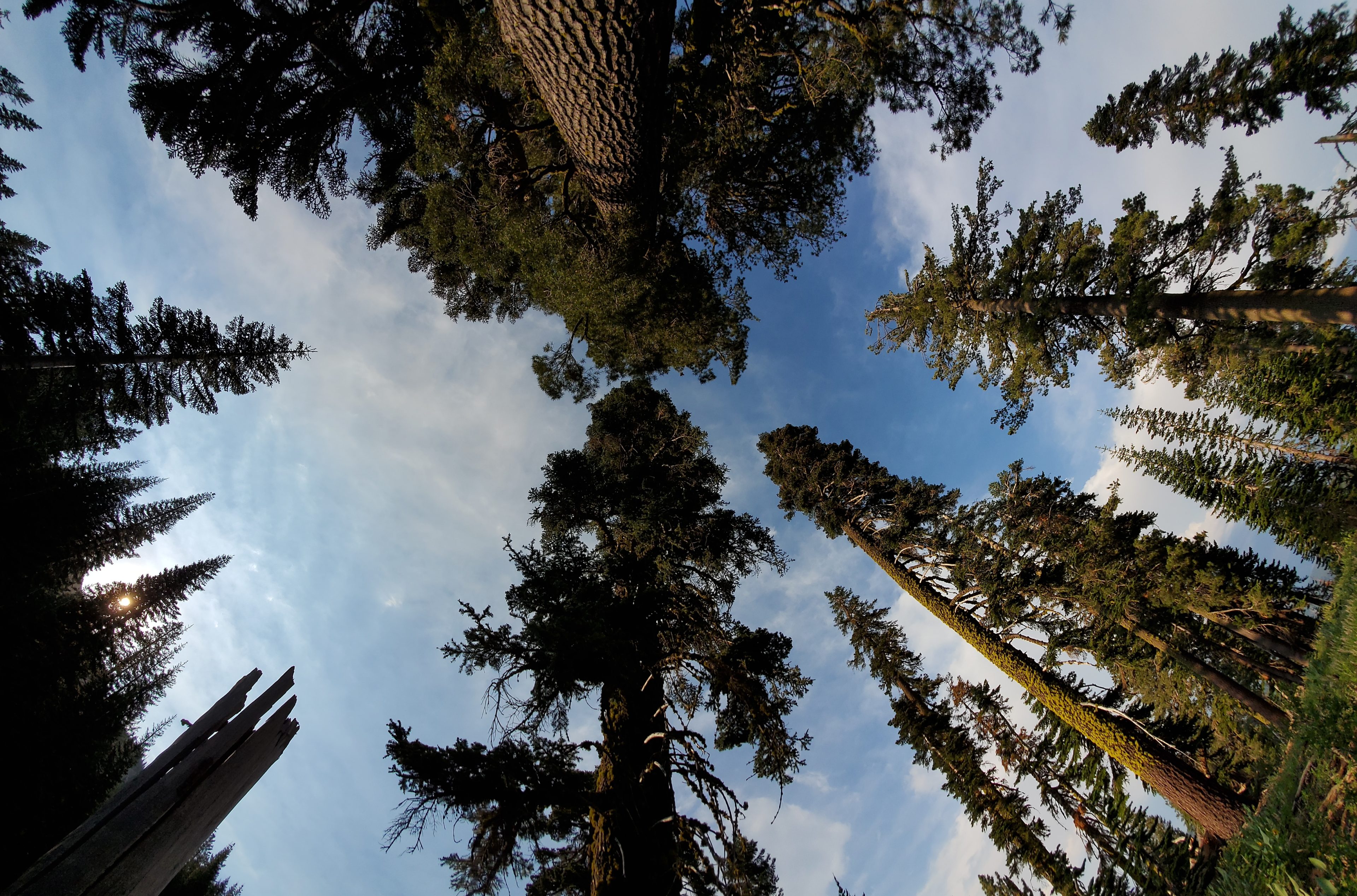
Sometimes I’d feel like walking around or stretching, but not usually that long. On the last night, I walked up a nearby peak, which took a couple of hours, 7km and 1000 ft elevation is my estimate. But then another wave of fatigue would come. I wanted to just lie in my hammock and feel the discomfort. Again, it was like being sick, when you think you’re getting better, and walk around a bit, only to find yourself lying down a few minutes later… “ah, that’s much better. Lying down feels so good…”
Doing activity wasn’t generally very appealing. Thinking wasn’t as appealing. So in that way I thought it was like a psychedelic journey, in which you just go to the body more often.
Fasting has a boot-camp-like nature (based on my imaginings of boot camp), in which there is just continuous challenge without much of a break. But it’s a manageable challenge. It’s not all that painful, and the pangs in the stomach area weren’t, for me, all that intense. It’s just a long time to feel tired. I never got to some state where I had tons of energy, like I’ve heard some describe from their long term fasts. I never had some crazy hallucination or wilderness encounter with a bear or spirit animal, like I read about in the book Soulcraft, a book which was part of my inspiration for trying this.
There was a really cool lightening storm on the 2nd day.

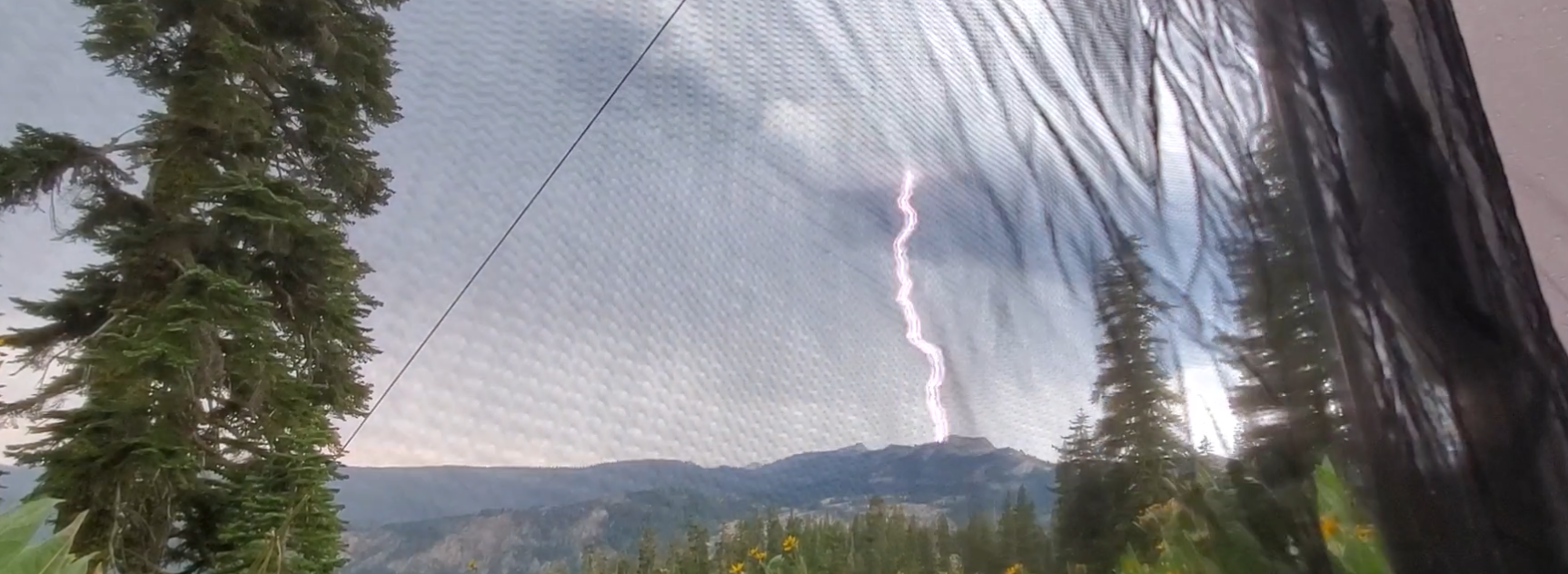

Meaning from suffering
I did have a modest internet connection, and sent some texts and emails to friends. I was surprised that I was able to write well the entire time. I could think when I wanted to, I just didn’t want to as often.
One of them told me he was reading Viktor Frankl’s book, Man’s Search For Meaning, and that the 2nd half of it reminded him of things I’d recently told him, about living our potential. I felt open to a bit of mind food, and listened to the last half (2 hours) of the audiobook, out of curiosity to see what he saw about me. I was probably also looking for a diversion from the hunger.
The part that stood out to me the most were the categories of meaning that Frankl wrote about:
- Work
- Love
- Suffering
I thought about how much I find meaning in suffering, and why that might be. Could it be, I wondered, because I am lacking meaning in the first two areas?
There was this quote, “Suffering ceases to be suffering at the moment it finds a meaning.”
I asked myself what meaning my suffering has. And I thought about how the suffering meaning I seek out (e.g., doing this fast) is related to my work as a therapist, which usually entails guiding others through suffering. And how I feel that I will not be good at that work if I don’t suffer myself.
And I thought of how my work meaning is related to love meaning in various ways. My work is a primary vehicle through which I can give love, and also it’s a way I try to earn love from the world, which tends to love those most who suffer for the collective (which is a lot of what work often entails). And I noticed fear that if I don’t continuously strive to earn love through work, that I won’t be loved enough and will be alone and perpetually afraid.
And yet, here I was, alone, without food, and doing alright. I was too hungry to be afraid! I was too hungry to be feeling unloved. The meaning was there, in the suffering. And the suffering forced my own love to come out of the woodwork for myself. The experience was simultaneously unpleasant, and full of richness. Half of me cared about the unpleasantness, but I thought about the idea that pure awareness has no preference for pleasant vs unpleasant. It just wants to experience everything.
I felt some sadness for myself, that I choose to suffer in search of meaning and love, and compassion that there is a sort of method to the madness of how I go about that quest.

Breaking fast
I woke up before sunrise the last 2 days, to bird song and a clear view of the brightening horizon to the east. That was a nice surprise for me, since I almost never see the first 2-3 hours of the daylight. I wondered, would this sleep reset last? In 3 nights I had shifted my circadian rhythm earlier by 3 hours, to the point that I was waking up well before sunrise without an alarm. Well, I suppose the birds going nuts and the glowing eastern horizon were an alarm of sorts.
On the last (3rd) morning, I did feel better than the 2nd morning. I’m a little curious about what another 4th day would have felt like. Packing up, I felt a strange mix of excitement and relief, and also some sadness that the experiment was ending, and that I wasn’t going for a 4th night. But I wasn’t too ambivalent. I knew 3 days was good for this time. How did I know? I don’t know.
I returned home by 9am on Monday and, to my surprise, didn’t immediately start shoving ripe avocados in my face. Instead I took a glorious mindful shower, unpacked mindfully, and got out my computer and started mindfully going through some email and doing some writing and video processing. I still had another couple of hours in me, it seemed. I was feeling strong, in control of myself, and focused.
At a certain point, I felt it was time to eat. I remembered that I had heard that one can break a long fast somewhat unsafely, and so watched a video that recommended having only lean protein at first, not fat or carbs. I pretty much ignored it. Although I did have some bone broth which was recommended. I made a few eggs cooked in butter with avocado, and just took it easy, seeing if my stomach would get upset or if I’d feel bad. I didn’t. I expected the meal to taste 10 times better than normal. It was good, but maybe 1.5x better. I did find myself eating mindfully, focused on the fact that I was eating, finding that more special than normal.
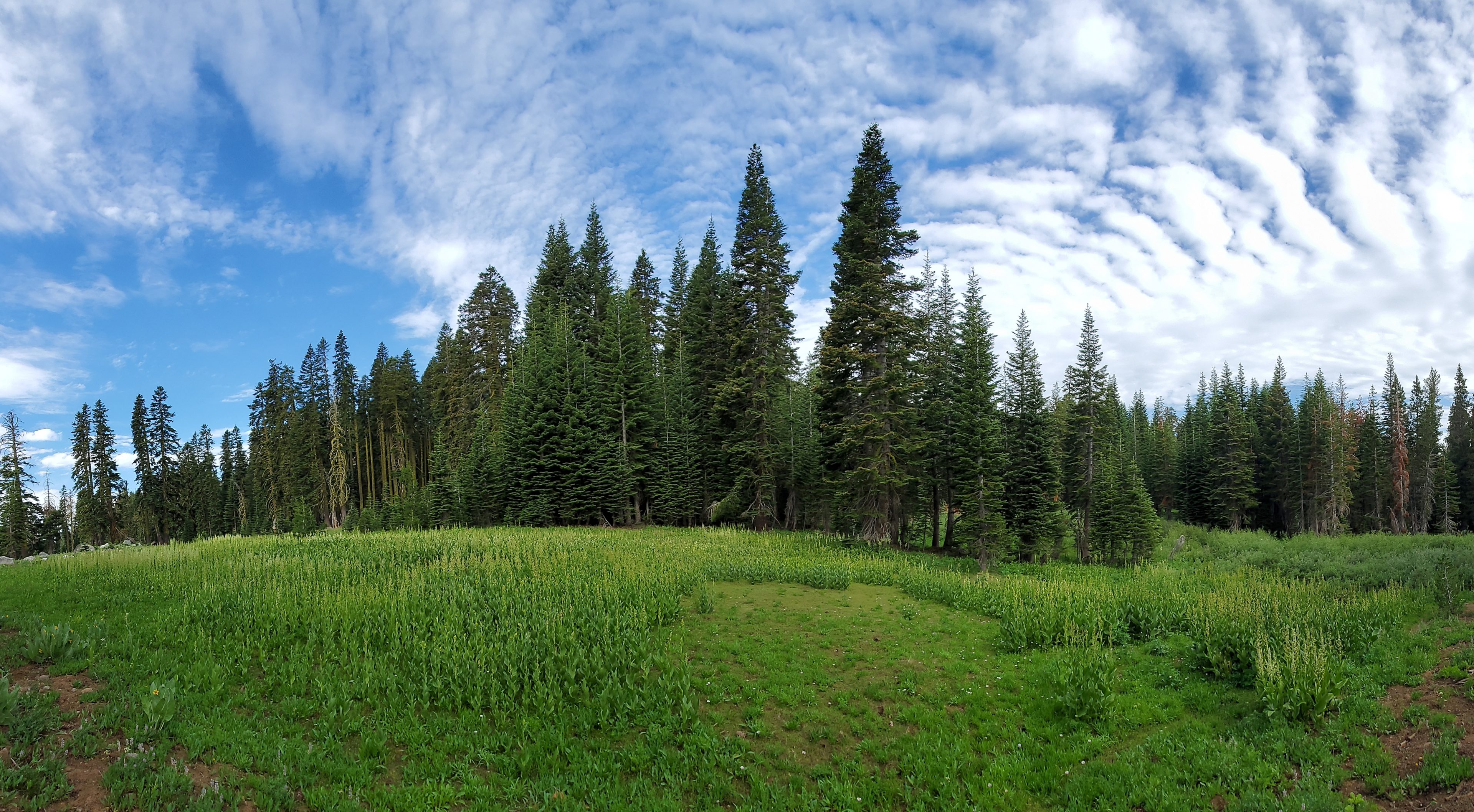
The treasure of voluntary suffering
I’m writing this after almost 2 full days post-fast, and I can say that I’m still feeling positive effects, including more calmness and focus. I’m not sure how much of this boost was from simply taking a 3 day retreat from mental input, being away from people and immersed in nature, and how much was from fasting.
I think the fasting adds another layer to a meditation retreat, which is already difficult, since we have to face the boredom, anxiety, and other experiences that arise while meditating a good portion of the day. Add hunger and low energy on top of all that, and it weakens the “off switch” of daydreaming or checking-out. You can daydream while fasting, but the pain is still there. It locks you in a box you can’t get out of. But the box is bearable, it’s just a state that, if not forced into, most of us would hit the eject button to leave after just a few hours. I was close enough to food that the eject button was only a 3.5 hour walk away at all times. That was enough of a barrier to get me through each full day, to evening, at which point it was easier to lie in my tent sheltered from mosquitos. The easy way (not walking home at dusk) became the hard way (staying until morning). Fasting some significant distance away from food is sort of a sink-or-swim situation, except that sinking can’t happen, because no one dies from not eating for a few days. So it’s swim-or-swim. It’s a be-hungry-or-be-hungry situation. You can’t not become stronger. New strength through suffering (hunger fatigue) is the only path available. How do we get stronger by being weak as hell? I’m still trying to figure that out, but I suppose it’s the nature of life. Life is antifragile. Our spirits get stronger from certain types and degrees of suffering.
The day after breaking the fast, I woke up relatively early (by my standards), drank some water, went to the bathroom, and started working. I didn’t make coffee. I thought about exercising, but realized I could do that later and wanted to exercise my brain. Around 10:30 AM, I made bulletproof decaf coffee, and worked another couple of hours. Around 1 I felt ready for a meal, but decided I should exercise before I got full. I went running and swimming, and ate sometime around 3 or 4 pm. This surprised me, as I thought my body would be somewhat ravenous from not eating for 3 days and wanting to make up for that. But it seems like something stuck from the fast, or at least the retreat.
My guess is that some willpower exertion during fasting is transferable to other activities, and also has momentum to it. I thought about how I was walking home by 6am on the last day, and had walked 7 miles with a 20 lb backpack by 9am, having had no food for the previous 65 hours. Why couldn’t I then, on a normal day, get up at 5am and go for a run before breakfast? Surely that is in me. Of course it is. This fast reminded me of that. I knew it was in me from other tough life experiences as well. But the question is, will I do it, when I’m comfortable in bed, and can sleep until 8, and then immediately make my cup of coffee, and then sit at the computer being pseudo-productive? That is a very different starting point for the day than is waking up on a mountain in a tent, hungry, with perfectly ripe avocados waiting for me at the end of a 7-mile walk home, and nothing but more hunger and isolation at the beautiful campsite.
That seems to be the tradeoff. Suffer and feel pride, challenge, growth, strength, and meaning. Or don’t suffer enough and instead feel comfort, stagnation, perhaps shame, and existential anxiety due to knowing that our full potential isn’t being activated. Some might argue against that view, and maybe I’m wrong about this, but it feels true to me. The work and love forms of meaning are, in a way, a form of suffering as well. Both require generous giving, of pouring out of ourselves. And yet we are eventually refilled, compensated with interest.
When I was fasting, I thought a lot about being done, and returning home, and eating. After two days I almost didn’t do the 3rd. The call to return was strong. I imagined contentment at home. A thought that kept me going was remembering how I am so often not, in fact, content at home. That the contentment is a mirage. That when I got home, I would almost immediately think about how I only did two days, and what dimensions the third day would have revealed. I knew inside that I would benefit from a 3rd day. I would know that I started a scary and arduous adventure, but didn’t finish it out of fear, and never reached all of the treasure.
I feel pretty good about 3 days, I feel that some treasure was found. I hope it doesn’t slip through my fingers too quickly. I still wonder a little what treasure I might have found, had I ventured a 4th day. Maybe I’ll go that far next time. It’s not about the number of hours or days though. There’s such a thing as too few and too many, and it depends on the individual.
I’ve already, after less than two days back, thought about how I miss that growth that part of me knew was occurring, on some level, even before I broke the fast. Do I also miss the suffering itself? I’m not sure; I just might.
